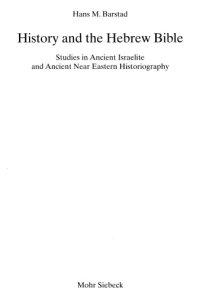
Ebook: History and the Hebrew Bible: Studies in Ancient Israelite and Ancient Near Eastern Historiography
Author: Hans M. Barstad
- Series: Forschungen zum Alten Testament 61
- Year: 2008
- Publisher: Mohr Siebeck
- City: Tübingen
- Language: English
- pdf
Chapter I: History and the Hebrew Bible ...................................................... 1 1.1 Background ............................................................................................ 1 1.2 The Recent History Debate ................................................................... 2 1.3 The Hebrew Bible ................................................................................. 8 1.4 A Narrative Alternative ...................................................................... 13 1.5 Narrative Truth .................................................................................... 15 1.6 Summing Up ........................................................................................ 23 Chapter 2: Issues in the Narrative Truth Debate ......................................... 25 2.1 The History Problem ........................................................................... 25 2.2 "The New History" ............................................................................. 26 2.3 "The Linguistic Turn" ......................................................................... 28 2.4 Fact Versus Fiction ............................................................................. 31 2.5 Fact, Fiction, and the Narrative Mode ............................................... 33 2.6 Ancient History ................................................................................... 35 2.7 Final Remarks ...................................................................................... 37 Chapter 3: "Bibliophobia" in Ancient Israelite Historiography ................. 39 3.1 The Problem ........................................................................................ 39 3.2 Historical Truth in Ancient Sources ................................................... 40 3.3 Some Examples from the Bible .......................................................... 43 3.4 Conclusion ........................................................................................... 45 Chapter 4: The Dating of the Israelite Tradition ......................................... 46 4.1 Introductory Remarks ......................................................................... 46 4.2 Deuteronomy ....................................................................................... 50 4.3 The Deuteronomistic History ............................................................. 51 4.4 The Common Theology of the Ancient Near East.. .......................... 54 4.5 A Hebrew Einheitskultur .................................................................... 63 4.6 Scribes, Sources and Diachronic Growth .......................................... 65 4. 7 The Persistence of the Tradition ........................................................ 67 4.8 Final Remarks ...................................................................................... 68 Chapter 5: Is the Hebrew Bible A Hellenistic Book? ................................. 70 5.1 Background .......................................................................................... 70 5.2 Lemche’s First Argument.. ................................................................. 71 5.3 Lemche’s Second Argument.. ............................................................. 72 5.4 Lemche’s Third Argument... ............................................................... 72 5.5 Lemche’s Fourth Argument... ............................................................. 80 5.6 Conclusion ........................................................................................... 88 Chapter 6: The Myth of the Empty Land ..................................................... 90 6.1 Preliminary Remarks ........................................................................... 90 6.2 The Biblical Evidence ......................................................................... 97 6.3 The Archaeology of Judah During the "Exilic" Period .................. Ill 6.4 The Evidence from Trans jordan ....................................................... 117 6.5 The Neo-Babylonian Empire and Judah .......................................... 121 6.6 Conclusions ....................................................................................... 131 Chapter 7: Judah in the Neo-Babylonian Period ....................................... 135 7.1 Background ........................................................................................ 135 7.2 The Archaeology of Neo-Babylonian Judah ................................... 140 7.3 The Neo-Babylonian Empire ............................................................ 144 7.4 Judah in the Neo-Babylonian Economy .......................................... 149 7.5 Conclusions ....................................................................................... 158 Sources and Acknowledgements ................................................................ 161 In this collection of essays, Hans M. Barstad deals thoroughly with the recent history debate, and demonstrates its relevancy for the study of ancient Israelite history and historiography. He takes an independent stand in the heated maximalist/minimalist debate on the historicity of the Hebrew Bible. Vital to his understanding is the necessity to realize the narrative nature of the ancient Hebrew and of the Near Eastern sources. Equally important is his claim that stories, too, may convey positivistic historical "facts". The other major topic he deals with in the book is the actual history of ancient Judah in the Neo-Babylonian and Persian periods. Here, the author makes extensive use of extant ancient Near Eastern sources, both textual and archaeological, and he puts much weight on economic aspects. He shows that the key to understanding the role of Judah in the 1st millennium lays in the proper evaluation of Judah and its neighbouring city states within their respective imperial contexts. A proper understanding of the history of Judah during the 6th century BCE, consequently, can only be obtained when Judah is studied as a part of the much wider Neo-Babylonian imperial policy.
Download the book History and the Hebrew Bible: Studies in Ancient Israelite and Ancient Near Eastern Historiography for free or read online
Continue reading on any device:

Last viewed books
Related books
{related-news}
Comments (0)